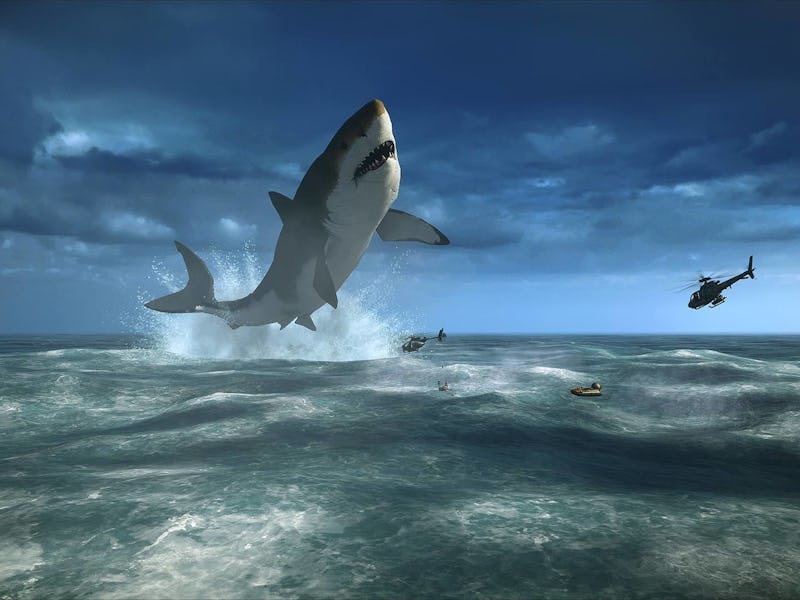'Meg,' the 80-Foot Shark, Is About to Eat Popular Culture
You can learn a lot about a culture from its giant carnivorous fish.

Steven Alten’s magnum opus is considerably more magnum than opus. It’s not that Meg: A Novel of Deep Terror is a bad book — though it is a very bad book — but that it’s good in a very specific, very stupid way. Meg is, in essence, Moby Dick for morons, the story of a scientist’s quest to kill the prehistoric shark he’s let loose in the Pacific. It is potently metaphorical while also being so deliberately cartoonish that it can’t help but undermine itself. The news that broke yesterday — after almost 20 years in development at a variety of Hollywood studios, the best-worst shark book ever written may finally swim onto celluloid — should be greeted with cheers because Meg is the giant monster we deserve, the giant monster we need.
When Meg was published in 1997, it was almost immediately derided as an underwater rewrite of Jurassic Park. That was entirely unfair, but not to Alten. It was unfair to Michael Crichton, who took great pains to fabricate an internally consistent and logically persuasive world then grappled with the scientific and moral ramifications of his characters’ decisions. Ultimately, Jurassic Park is about hubris. Meg, on the other hand, is ultimately about a really big shark. This passage from the novel gives a sense of just how little subtext it contained:
“Maggie? I’ve been trying to reach you all morning. Where are you?”
“Never mind that. I just saw the news report. Where did that shark come from? Where’s Jonas? Has anyone spoken with him yet?”
“Slow down. Jonas is recovering in the Guam naval hospital. He’s okay, but there’s a guard posted at his door so no one can speak with him. The Megalodon’s for real. Looks like you were wrong about your husband.”
Despite lackluster prose styling, the book immediately became a phenomenon. It wasn’t a phenomenon in the way some modern YA franchises are, but rather in a sort of, “sure, fuck it” sort of way. The book’s original cover showed a giant shark eating a tyrannosaur, which represented truth in advertising and the fundamental allure of the franchise: scale.
What’s remarkable about Meg is that it works for one simple reason: The existence of an animal like Carcharocles Megalodon is so mind boggling that grappling with the mere fact of its being always proves entertaining. The joy of Jurassic Park the novel was ideas. The joy of Jurassic Park the movie was seeing dinosaurs. The joy of Meg was just thinking, “Holy crap, I can picture that and it’s nuts.”
Presumably the simplicity of that core concept is what has kept rights shackled in development hell for so long. The story, an ancient shark escapes the geothermal duct-heat Mariana Trench in a cloud of another shark’s blood and goes on a whale/human killing rampage, is certainly filmable, but the shark will look, by definition, ridiculous. It’s like making a movie about a 20-foot-long chipmunk (Ed Note: I’d watch it), the physicality will inevitably subsume the plot.
That was a problem in the early aughts, but it’s not a problem in 2015.
Meg will get made and be awesome because Hollywood finally has the technology. No, CGI was never the issue. Plotting was the issue. In the early aughts, blockbusting required complicated backstories and tons of scene setting. Today, directors like Guillermo del Toro, who was previously attached to the Meg project, Joss Whedon, J.J. Abrams and the like have proven that you can get around the need for constant explanation by having realistic characters occupy and unrealistic world. Just look at Pacific Rim. It’s pretty much the same movie - robots are just gunning up the plot.
And Meg is a story that needs to be told, a story about some stupid big deadly thing that must be stopped. After years of identifying with super powered humans, audiences need to cheer for powerless humans doing battle with a thing that will, in all likelihood, kill them. It’s a more ambitious story — in a sense — and an evolutionary step forward for summer movies. It’s like Jaws if Jaws was about the inevitability of death, not killing preppies.
It’s also completely spoiler proof. In the book, the scientist kills the shark by driving a submarine through its mouth and into its heart. Tell me you’re not going to the theater to see that.